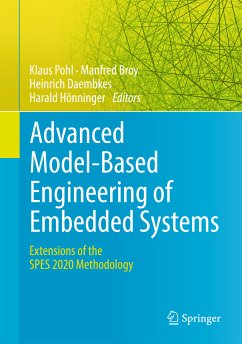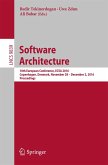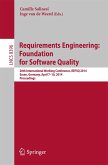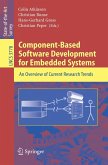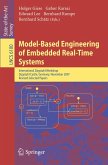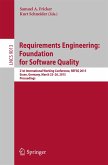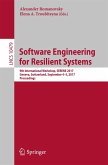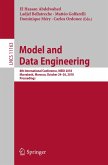This book provides a comprehensive introduction into the SPES XT modeling framework. Moreover, it shows the applicability of the framework for the development of embedded systems in different industry domains and reports on the lessons learned. It also describes how the SPES XT modeling framework can be tailored to meet domain and project-specific needs.
The book is structured into four parts:
Part I "Starting Situation" discusses the status quo of the development of embedded systems with specific focus on model-based engineering and summarizes key challenges emerging from industrial practice.
Part II "Modeling Theory" introduces the SPES XT modeling framework and explains the core underlying principles.
Part III "Application of the SPES XT Framework" describes the application of the SPES XT modeling framework and how it addresses major industrial challenges.
Part IV "Evaluation and Technology Transfer" assess the impact of the SPES XT modeling framework and includes various exemplary applications from automation, automotive, and avionics.
Overall, the SPES XT modeling framework offers a seamless model-based engineering approach. It addresses core challenges faced during the engineering of embedded systems. Among others, it offers aligned and integrated techniques for the early validation of engineering artefacts (including requirements and functional and technical designs), the management of product variants and their variability, modular safety assurance and deployment of embedded software.
USPs:
· Reports on the tailoring of the state-of-the-art model-based SPES XT framework to facilitate the application in different industrial domains including automotive, avionics, and automation industry.
· The SPES XT framework provides a solid foundation of integrated modeling and analysis techniques especially for model-based engineering of embedded systems.
· Reports on the experiences and lessons learnt when applying the framework in different domains.
The book is structured into four parts:
Part I "Starting Situation" discusses the status quo of the development of embedded systems with specific focus on model-based engineering and summarizes key challenges emerging from industrial practice.
Part II "Modeling Theory" introduces the SPES XT modeling framework and explains the core underlying principles.
Part III "Application of the SPES XT Framework" describes the application of the SPES XT modeling framework and how it addresses major industrial challenges.
Part IV "Evaluation and Technology Transfer" assess the impact of the SPES XT modeling framework and includes various exemplary applications from automation, automotive, and avionics.
Overall, the SPES XT modeling framework offers a seamless model-based engineering approach. It addresses core challenges faced during the engineering of embedded systems. Among others, it offers aligned and integrated techniques for the early validation of engineering artefacts (including requirements and functional and technical designs), the management of product variants and their variability, modular safety assurance and deployment of embedded software.
USPs:
· Reports on the tailoring of the state-of-the-art model-based SPES XT framework to facilitate the application in different industrial domains including automotive, avionics, and automation industry.
· The SPES XT framework provides a solid foundation of integrated modeling and analysis techniques especially for model-based engineering of embedded systems.
· Reports on the experiences and lessons learnt when applying the framework in different domains.
Dieser Download kann aus rechtlichen Gründen nur mit Rechnungsadresse in A, B, BG, CY, CZ, D, DK, EW, E, FIN, F, GR, HR, H, IRL, I, LT, L, LR, M, NL, PL, P, R, S, SLO, SK ausgeliefert werden.

